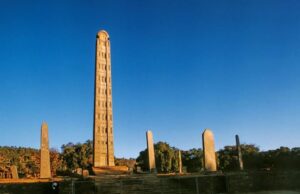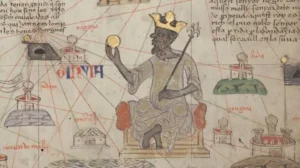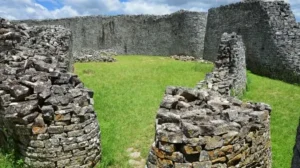Africa’s rich and diverse history is marked by the rise and fall of powerful empires that made significant contributions to culture, economy, and politics. From ancient Sudan to medieval Zimbabwe, here are seven African kingdoms that left a lasting impact on history.
1. The Kingdom of Kush
Though often overshadowed by its Egyptian neighbors to the north, the Kingdom of Kush stood as a regional power in Africa for over a thousand years. This ancient Nubian empire reached its peak in the second millennium B.C. when it ruled over a vast swath of territory along the Nile River in what is now Sudan.
Almost all that is known about Kush comes from Egyptian sources, which indicate that it was an economic center that operated a lucrative market in ivory, incense, iron, and especially gold. The kingdom also had its own distinct culture and traditions, which included building pyramids and creating beautiful art.
2. The Land of Punt
Often referred to as the “Land of the Gods,” the Land of Punt was a fabled trading partner of ancient Egypt. Located in the Horn of Africa region, modern-day Somalia and Eritrea, Punt was renowned for its wealth and abundance of goods such as gold, aromatic resins, blackwood, ebony, ivory, and exotic animals. Egyptian records describe several successful expeditions to Punt, highlighting its importance as a trade hub and its contributions to the wealth and culture of ancient Egypt.
3. Carthage
Founded by the Phoenicians in the 9th century B.C., Carthage grew into a major power in the western Mediterranean. Located in present-day Tunisia, Carthage became famous for its formidable navy and commercial empire, which extended across North Africa and into parts of Europe and the Middle East.
The city-state was involved in several conflicts with Rome, known as the Punic Wars, which ultimately led to its destruction in 146 B.C. Despite its downfall, Carthage’s legacy endured through its contributions to maritime trade, urban planning, and military strategy.
Also, read; The Dogon People’s Advanced Astronomy Knowledge: Surpassing Ancient European Understanding
4. The Kingdom of Aksum
 The Kingdom of Aksum, located in modern-day Ethiopia and Eritrea, was a significant trading empire from the 1st to the 7th century A.D. Aksum’s strategic position along trade routes between Rome and India allowed it to become a wealthy and influential center of commerce.
The Kingdom of Aksum, located in modern-day Ethiopia and Eritrea, was a significant trading empire from the 1st to the 7th century A.D. Aksum’s strategic position along trade routes between Rome and India allowed it to become a wealthy and influential center of commerce.
The kingdom is also noted for its impressive architectural achievements, including towering obelisks and early Christian churches. Aksum played a crucial role in the spread of Christianity in Africa, making it one of the first major empires to adopt the religion officially.
5. The Mali Empire
 The Mali Empire, which flourished from the 13th to the 16th century, is perhaps best known for its legendary ruler, Mansa Musa, who is often regarded as one of the richest individuals in history. Located in West Africa, the empire controlled important trade routes across the Sahara Desert, dealing in gold, salt, and other valuable commodities.
The Mali Empire, which flourished from the 13th to the 16th century, is perhaps best known for its legendary ruler, Mansa Musa, who is often regarded as one of the richest individuals in history. Located in West Africa, the empire controlled important trade routes across the Sahara Desert, dealing in gold, salt, and other valuable commodities.
The Mali Empire was also a center of Islamic learning and culture, with the famous city of Timbuktu housing numerous universities and libraries that attracted scholars from across the Islamic world.
6. The Songhai Empire
Following the decline of the Mali Empire, the Songhai Empire emerged as the dominant power in West Africa during the 15th and 16th centuries. At its height, Songhai was one of the largest empires in African history, stretching from present-day Niger to the Atlantic coast.
The empire was renowned for its administrative efficiency, military prowess, and vibrant cultural life. The city of Gao served as the capital, while Timbuktu continued to thrive as a center of commerce and Islamic scholarship. The Songhai Empire’s legacy includes advancements in governance, education, and architecture.
7. The Great Zimbabwe
The Great Zimbabwe civilization, which peaked between the 11th and 15th centuries, is known for its impressive stone structures, including the iconic Great Enclosure. Located in present-day Zimbabwe, this kingdom was a major trading empire, dealing in gold, ivory, and other goods with merchants from as far away as China and Persia.
The architectural prowess of the Great Zimbabwe people is evident in the massive, intricately built stone walls and towers that still stand today. These structures reflect a highly organized society with significant social and economic complexity.
Conclusion
These seven influential African empires played pivotal roles in shaping the continent’s history and contributed to the global cultural and economic landscape.
From the wealth of the Kingdom of Kush to the architectural marvels of Great Zimbabwe, these civilizations demonstrate Africa’s rich heritage and its lasting impact on the world. Understanding their histories provides valuable insights into the continent’s past and its contributions to human civilization.

